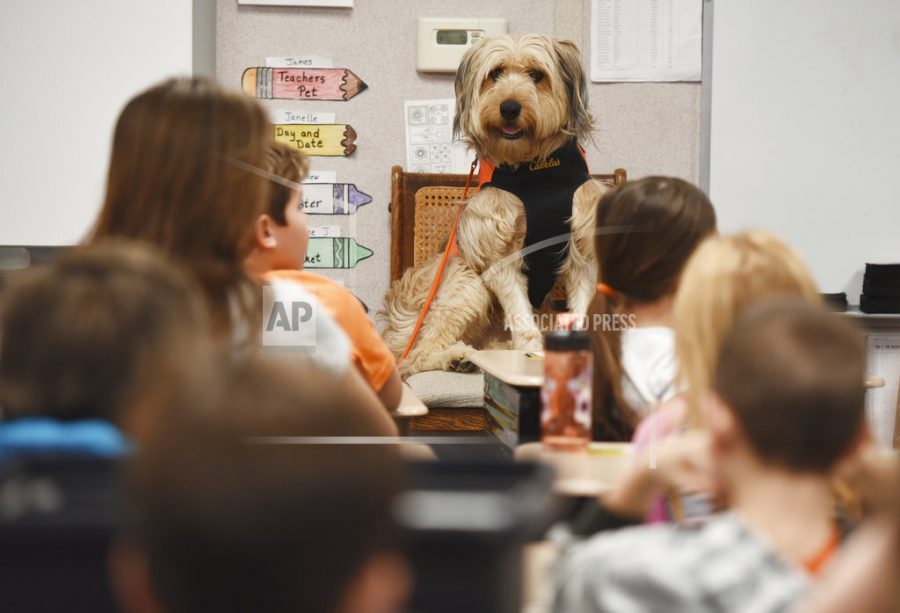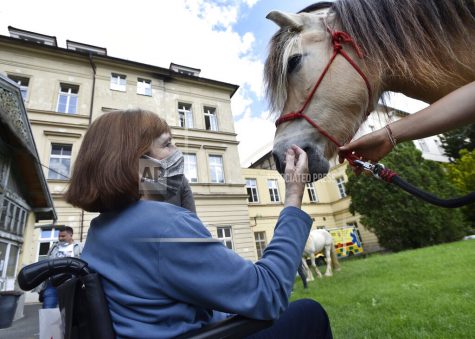(Updated 6:00 pm Oct. 22 to correct minor error.)
For the first time ever, UNF will need to order kibble and hay to feed some of its staff.
The Brooks College of Health will be using trained dogs to help students in need of emotional assistance. Students who need a more involved therapy option might be sent to UNF’s new equine therapy program.
The UNF animal-assisted interventions, or AAI program, is a combination of four efforts to incorporate animals into someone’s day-to-day life. Through efforts like animal-assisted activity, education, and therapy with community partners, UNF is making strides in this initiative. The program is supervised by Dr. Carlene Taylor, a UNF clinical assistant professor and licensed mental health counselor nationally recognized for her expertise in human-animal interaction and animal-assisted therapy in counseling. She said the goals of the AAI program are to teach, research, and provide service.
Students can get involved in the education aspect of the AAI program by taking a foundational special topics course that is available to all students or by obtaining certifications offered through UNF. There are also numerous opportunities for students to get engaged through service projects.
“We have the Campus Canines program which is new this year,” said Taylor. “We have a group of volunteer handlers and dogs that will come onto campus and do special events up to three times a month.”

Some of these events include stress, anxiety, and depression screenings which can lead students to seek out further services such as counseling through the PERCH program, which stands for Prevention, Early-Intervention, Resiliency through Counseling and Holistic Health. Students might see volunteer handlers with their dogs at booths across campus or in the library during finals week for the PAWS Your Stress event, giving students a chance to pet and snuggle with dogs throughout the day.
In addition to the endeavors of the Campus Canines, PERCH counseling is overseeing the implementation of UNF’s equine therapy program at Hunters Run Farm in Ponte Vedra.
Alison Leapley-Williams, a recent AAI graduate and PERCH counselor, will be heavily involved in the student-run equine therapy program. She said she finds the program incredibly rewarding. She watched her clients make tremendous progress in the pilot run last spring.
“All of the clients have made huge jumps in their personal lives,” she said. “They pushed through to what they needed to do and got this accomplished, built boundaries and self-confidence, even self-awareness.”

Animal-rich environments can induce interactions that provide psychosocial and physical benefits for humans, and these interactions are especially beneficial for more vulnerable populations, according to the American Veterinary Medical Association. Nemours Children’s Health in Jacksonville has an animal-assisted therapy program that helps heal humans through mental health services using dogs and ponies. When an equine element is added, a new world of opportunities opens. The relationship between humans and horses is special and often gives therapy clients that sense of empowerment they are looking for, according to Leapley-Williams.
Taylor emphasized the similarities between horses and shy clients. If a client can successfully ask a large animal to do something, then speaking in front of a class becomes much less intimidating. If there is a problem in the relationship between a human and a horse, the problem is always the human. Through equine therapy, people can recognize and work on their personal struggles in a human-animal relationship and get immediate feedback, which can then be applied to all of their other relationships.
“The natural way the horse is in the world is very easily identifiable in students who are in unfamiliar settings, who are trying to live as a group and don’t exactly know how to do that and who might be fearful or hypervigilant, or who might’ve had some adverse experiences early in their lives that make them more prone to feel like they’re vulnerable,” Taylor said.
The steps toward implementing the equine therapy program at UNF are well underway. In fact, groups for the six-week program will be formed beginning in October for PERCH clients. For those who are not seeking therapy, groups can schedule a visit at Hunters Run and will be encouraged to support the program by making a donation.
Taylor said the important thing to remember is the incredibly emotional connection between animals and humans that allows people to grow through these interventions. “Animals make us human,” she said.
For more information, please contact Dr. Carlene Taylor or view this video on equine therapy here.
___
For more information or news tips, or if you see an error in this story or have any compliments or concerns, contact editor@unfspinnaker.com.















